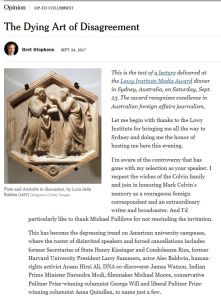Join getAbstract to access the summary!

Join getAbstract to access the summary!
Bret Stephens
The Dying Art of Disagreement
The New York Times, 2017
What's inside?
Before we can find common ground, we need to learn how to disagree.
Recommendation
Issues like gun control, health care and abortion deeply divide Americans. The reason why people can’t find a middle ground on these issues, says New York Times columnist Bret Stephens, is that people no longer make the effort to understand other people’s viewpoints – a prerequisite for engaging in genuine debate. At a lecture given at the 2017 Lowy Institute Media Award dinner in Australia, Stephens emphasized the important role of the media in rekindling the “art of disagreement,” which he says forms the backbone of any liberal democracy. getAbstract recommends Stephens’s lecture to media professionals, educators, and citizens of all stripes and political persuasions.
Summary
About the Author
Bret L. Stephens is an op-ed columnist at The New York Times.

















Comment on this summary